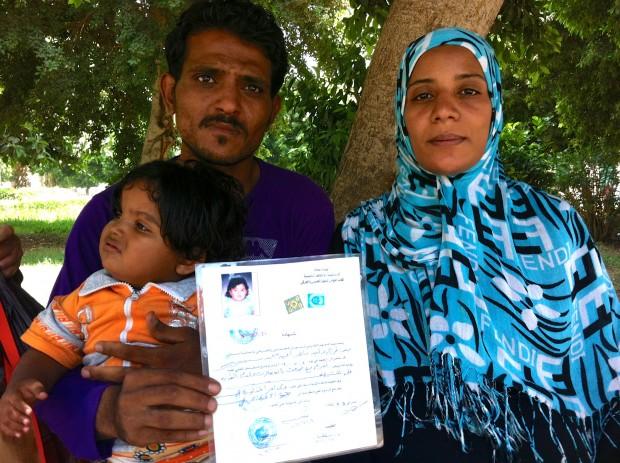Egypt’s President Invites Public Complaints
Walid Maher (holding his 3 year-old daughter) is asking the president for a better job or help with his child’s medical bills. He earns about three dollars a day.
This never would have happened when Hosni Mubarak was president.
On Friday evening, a few dozen protesters gathered outside the gate of Kasr al-Ittihadiya, one of three presidential palaces in Cairo. It was a small demonstration by Egyptian standards.
But on this street, next to the place where the ousted dictator used to conduct affairs of the state, Egyptians knew they could be stopped by security just for walking down the sidewalk in a group of five people. A demonstration here would not have been tolerated.
Hundreds of riot police were lined up outside the palace. And they stood by, looking bored, as protesters sent a message to their new president.
“Mohammed Mursi was brought to power by the revolution,” said activist Mohammed Talaat. “He has an obligation to free thousands of protesters still in military custody. This should be his top priority.”
Talaat said he hoped the president is being honest when he says he is listening to the concerns of the people. And they have no small amount of concern.
That was apparent on Saturday morning outside Abdeen Palace in downtown Cairo, another seat of government where President Mursi is expected to conduct official business. Outside one of the entrances, several dozen people gathered to submit personal petitions to the president himself.
Mahahten Abdel-Moneim Ibrahim came to Cairo from the Nile Delta town of Mansoura, a few hours drive away. She held a hand-written plea to President Mursi and waited for her turn to enter the palace and submit the petition to officials inside.
Ibrahim said her 34-year-old son got married almost a year ago. But he could not afford the rent and lost his apartment. Now, he is living at his parents’ home and he is desperate. The young man even threatened to kill himself out of shame, she said. “Please, can the president help her son and daughter-in-law find a place to live?”
When I asked if she expected Mursi to fix things, Ibrahim said, “Sure, God willing.”
A young father named Walid Maher came to the palace with his pregnant wife and their disabled 3-year-old girl.
“I make $3 a day selling packets of tissues on the street in Cairo,” he said. “My daughter’s medical bills add up to about $30 a week.”
The toddler can’t talk or walk, he said, and she needs surgery that costs more than $30,000.
Maher said he came to ask Egypt’s president for a better job, or at least some housing assistance just to get by.
Mursi is said to be locked in a power struggle with the powerful Egyptian military. But listening to people’s stories outside the palace offered a close-up view at the president’s biggest challenge: meeting the daily needs of millions of people living at the bottom of Egypt’s crippled economy.
The former leader with the Muslim Brotherhood has promised big things to the Egyption public. He has vowed to deal with the following five priorities in his first 100 days: traffic, trash, security, food and fuel. On top of that, Mursi’s government opened up two complaints offices for the public.
Within five days, the office received 10,000 petitions.
And they are still coming in from Egyptians like 60-year-old Mohammed Abu-Zeid Shayhoun.
Standing outside Abdeen palace, Shayhoun told me he is nearly blind and he can no longer work. He lives with his wife and four kids in a one-room apartment in Cairo and he brings in a pension of about a $1 a day.
“I went to local officials to ask for assistance and they told me to go ‘ask the revolution.'”
“It was us, the poor people,” Shayhoun said, “who made the revolution happen. If President Mursi doesn’t help us, we will have another revolution and we’ll get rid of him too.”
The ruling military council says it wants to hand over power to a civilian authority, but the generals still control most of the levers of political power in Egypt. Mohammed Mursi is staking his political success on electoral politics. The question is, has he set himself up for failure by raising impossibly high expectations?
Mohamed El-Baltagy is a member of parliament and a senior official with the Muslim Brotherhood’s Freedom and Justice Party.
“No one leader can solve everyone’s problems,” Baltagy told me at the party’s headquarters in downtown Cairo. “But President Mursi takes these petitions from the public seriously.”
When I brought up the pensioner’s comment about starting another revolution against Mohammed Mursi if he fails to deliver, Baltagy said, “this is not the time or place to be making demands of the new government. People will see the president is serious, when he starts to deliver on his promises.”
We want to hear your feedback so we can keep improving our website, theworld.org. Please fill out this quick survey and let us know your thoughts (your answers will be anonymous). Thanks for your time!
